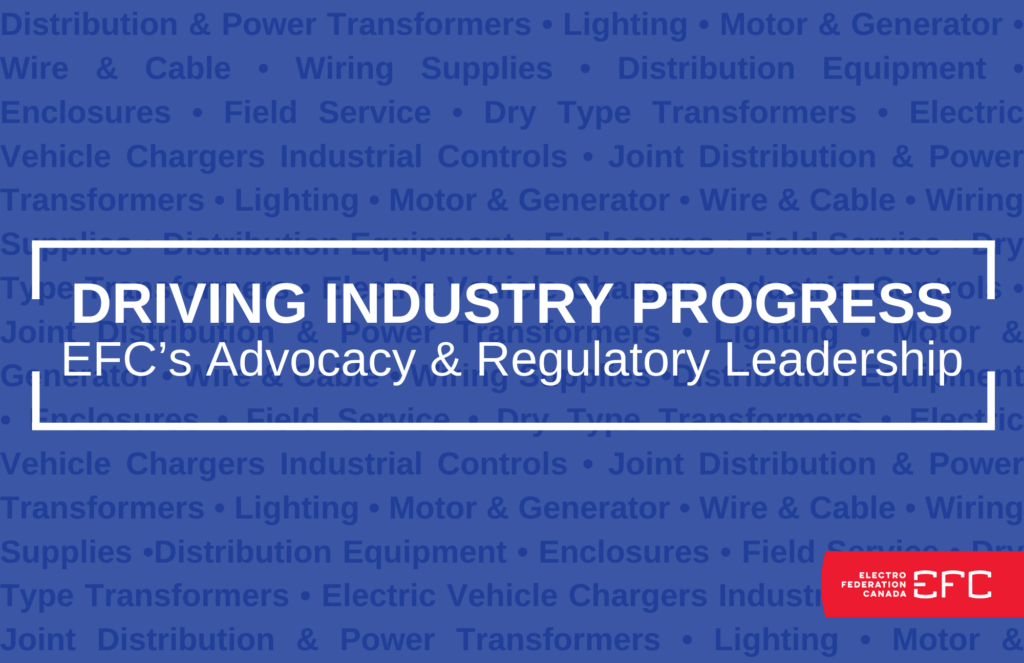Driving Industry Progress: EFC’s Advocacy and Regulatory Leadership

As the electrification landscape continues to evolve, so do the challenges and opportunities facing Canada’s electrical and automation industry. Electro-Federation Canada (EFC) is at the forefront, advocating for policies and regulations that not only support industry growth but also drive economic and environmental progress. Our Government Relations (GR) and advocacy efforts are more critical than ever, ensuring that Canadian businesses remain competitive in a rapidly changing global market.
Why Advocacy Matters
Our advocacy work is centered on key electrification priorities and legislative recommendations that shape the Canadian electrical and automation market. By providing a unified voice, EFC and our members are uniquely positioned as trusted advisors with expertise in supply chain and technology solutions required for advancement in electrification. EFC’s advocacy efforts seek to foster an environment where EFC members can thrive and compete while contributing to Canada’s energy security and sustainability goals.
Expanding Our Reach: Electrification Advocacy in Quebec
Recognizing the pivotal role that electrification plays in achieving Canada’s net-zero emissions target by 2050, EFC has expanded its advocacy efforts to the province of Quebec. In collaboration with NATIONAL Public Relations, EFC’s Government Relations Committee is implementing a government relations strategy to influence policy and regulatory frameworks that align with our industry’s objectives.
Our approach includes:
- Engaging with political and civil society leaders.
- Participating in stakeholder meetings and consultations.
- Advocating for policies that support electrification and energy efficiency.
- Positioning EFC as a trusted advisor in regulatory discussions.
Ontario’s Electricity Energy Efficiency Framework
During consultations for Ontario’s 2025-2036 Electricity Energy Efficiency Framework, EFC made several submissions in support of electrification and energy efficiency incentives. Our submission emphasized the need for expanded support for energy efficiency initiatives and retrofits. Ontario has committed $10.9 billion to a new electricity conservation and energy efficiency framework, featuring key programs and incentives that will shape the province’s energy landscape over the next 12 years. EFC will continue to monitor and engage in consultations throughout 2025 to ensure our members’ voices are heard.
Tariff Advocacy and Free Trade Efforts
With increasing trade uncertainties, EFC’s Government Relations Committee and Board of Directors have taken decisive action against tariffs imposed by the U.S. government. We have actively engaged with Finance Canada, advocating for a free trade for the electrical industry on both sides of the board. If necessary, fair trade measures, such as reciprocal tariffs, are recommended to protect Canada’s competitiveness, businesses operating in Canada, and Canadian jobs.
EFC staff have been reaching out through our Business Sections to verify HS codes relevant to EFC members including a list of desired exclusions. EFC will request these HS codes be ‘removed’ from retaliatory tariff lists. These are products where no or significantly limited alternatives are available to Canadians. By collaborating with our Business Sections, we ensure that our members’ interests are effectively represented in national policy discussions.
The Power of Collaboration: Business Sections & the Regulations Committee
EFC’s Business Sections provide a vital platform for members to collaborate on regulatory, compliance, and market-related challenges. These sections drive:
- Codes and standards harmonization.
- Trade law discussions.
- Market intelligence statistical programs and forecasting
- Advocacy for industry-wide policy changes.
- Regulatory submissions.
To further support our Business Section members, we launched the Regulations Committee in January 2025. This committee, open to all Business Section organizations, ensures that compliance professionals across organizations can stay informed about evolving regulations, share expertise, and knowledge. The Regulations Committee is also responsible for drafting regulatory submissions that represent the interests of Business Section members.
Upcoming Regulatory Engagements
Our commitment to regulatory leadership extends to addressing emerging challenges such as the PFAS (Per-and Polyfluoroalkyl Substances) Regulations. EFC has provided Business Section members with exclusive resources, including compliance guides and extension request templates. Our next Regulations Committee meeting, scheduled for April 3rd, will focus on preparing industry comments for upcoming PFAS consultations.
Get Involved: Shape the Future of Our Industry
Your voice is crucial in shaping the regulatory and advocacy landscape of our industry. We encourage members to:
- Join the Government Relations Committee to engage in advocacy initiatives and policy discussions. This committee is open to senior government relations professionals and senior leaders from each organization. Please contact Cherith Sinasac csinasac@electrofed.com
- Participate in the Regulations Committee to stay informed and contribute to regulatory compliance efforts. This committee is open to all Business Section members. Please contact Michelle Tirto at mtirto@electrofed.com
- Be Active in the Business Section to ensure your company’s perspective is represented in critical industry decisions. Contact Karen Ewing kewing@electrofed.com
EFC remains committed to supporting its members as we navigate an era of electrification, sustainability, and economic transformation. By working together, we can drive industry progress, enhance competitiveness, and secure a thriving future for the electrical and automation sector in Canada.
Let’s lead the change together!